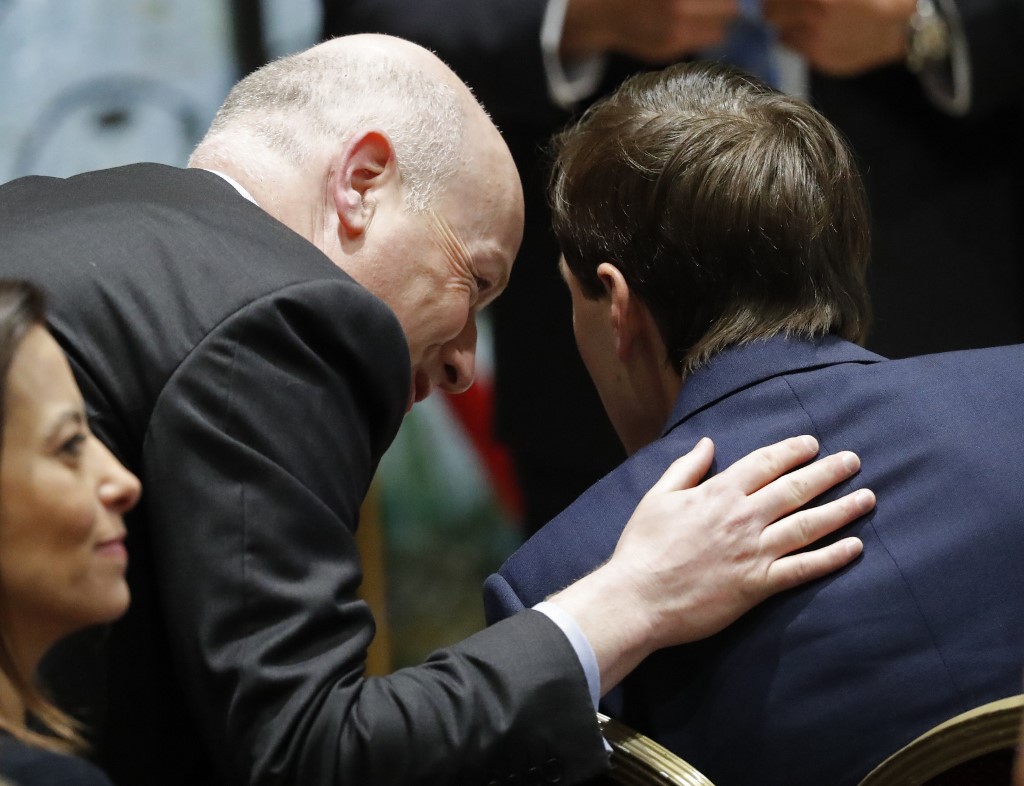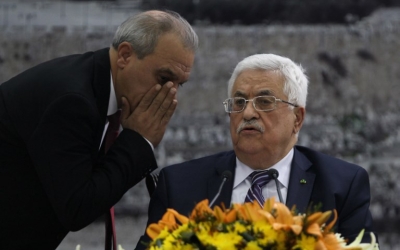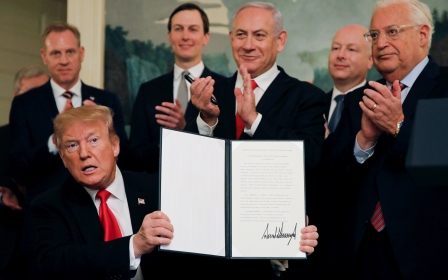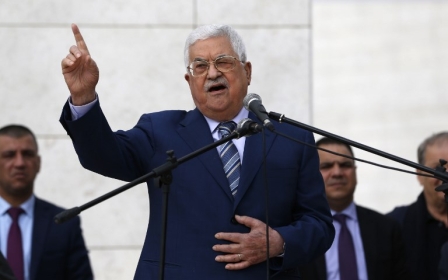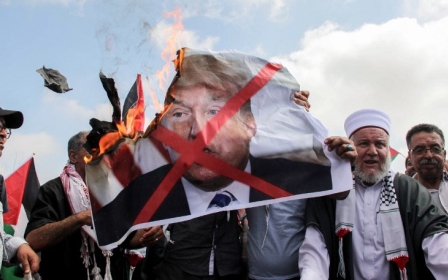‘Deal of the century’ is a surrender note, and Palestinians will not sign
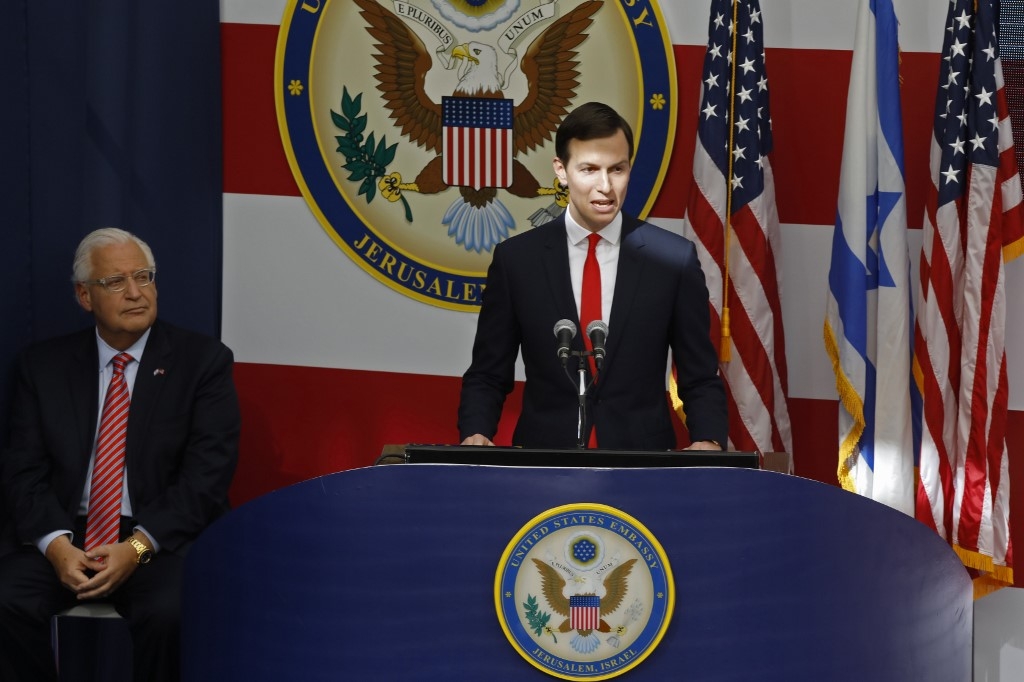
Jared Kushner, US President Donald Trump’s son-in-law and chief adviser on the Middle East, has recently taken to the airwaves to provide a taste of what the “deal of the century” will contain when it is published after Ramadan.
In the Arab world, people are familiar with the concept of fasting for a long time, only to break the fast with an onion, rather than a feast. That likely encapsulates what the peace plan will consist of - an onion, rather than a meaty deal.
Kushner’s false ‘truths’
Speaking recently at the Washington Institute for Near East Policy, Kushner revealed two key aspects of the plan. Firstly, it will not mention the longstanding position of successive US administrations that the solution to the Israel-Palestine conflict is through two states.
“If you say ‘two-state’, it means one thing to the Israelis, it means one thing to the Palestinians … You know, let’s just not say it,” Kushner said. “Let’s just say, let’s work on the details of what this means.”
The 'truth' that Jerusalem is Israel's capital is based on facts on the ground created through an illegal occupation
Secondly, he revealed that the plan would confirm Jerusalem as the capital of Israel. When Trump asked him about the potential impact of US recognition of Israel’s capital, he said: “I think short term it’s probably harder, because people will be more reactive and emotional. But long term, I think it helps because what we need to start doing is just recognising truths, and I think that when we recognised Jerusalem, that is a truth.”
The two aspects are, of course, linked. If there is no Palestinian state in the plan, why would the Palestinians need a capital anywhere?
It is important to note that what Kushner regards as “truth” is not always so. In fact, the “truth” that Jerusalem is Israel’s capital is based on facts on the ground created through an illegal occupation and annexation of East Jerusalem, and the building of illegal settlements in occupied territories.
The US decision to close its consulate in East Jerusalem - which would have served as its embassy to a future Palestinian state - and replace it with a Palestinian Affairs Unit in the newly opened embassy, is another indication of the death of the two-state solution, as far as this US administration is concerned.
Greenblatt’s trolling
Another of Kushner’s “truths” might be the US recognition of Israel’s illegal occupation and annexation of the Syrian Golan Heights, or the “truth” that the existence of five million Palestinian refugees is a “lie”.
Kushner takes the side of Israeli Prime Minister Benjamin Netanyahu in claiming that original refugees cannot pass their status on to their children and grandchildren, even though that is not a circumstance exclusive to Palestinian refugees.
While Kushner has been emptying the “peace plan” of any elements that address Palestinian rights, his partners - US Ambassador David Friedman and Jason Greenblatt, the special representative for international negotiations - have served other roles. Friedman was the major force behind the US embassy move to Jerusalem and the removal of the term “occupation” from State Department discourse.
Greenblatt, meanwhile, has taken to Twitter to act as a propagandist for Israel and to troll Palestinian leaders. Many of his attacks on Palestinians could easily have come from the Israeli foreign affairs ministry; he regularly condemns Hamas, mentioning the group dozens of times in recent months.
This has included tweeting an infographic produced by the Israeli army on Hamas’ rocket range, using it to justify the focus on Israel’s security in the “peace plan”.
In March, he went after Palestine Liberation Organization (PLO) executive committee member Hanan Ashrawi, saying she was wrong to condemn Israeli aggression against Gaza, and adding: “We support Israel’s right to defend itself.”
Failure to establish trust
Greenblatt has also repeatedly trolled PLO Secretary General Saeb Erekat, accusing him of “misleading” Palestinians. After Erekat criticised the “deal of the century”, Greenblatt tweeted: “Saeb, regretfully you continue to deceive your people - you know nothing about the contents of our plan. Your speculation is not helpful and to the contrary, it harms the Palestinian people and the prospects for peace.”
Such pronouncements are hardly conducive to establishing trust with the Palestinian side, especially as Greenblatt regularly lectures the Palestinian leadership, telling Erekat in another tweet: “I don’t agree w/ your assertions & you have offered no realistic solutions. Time to get serious & use your intellect.”
To be fair to Greenblatt, in a more conciliatory tweet to Ashrawi and Erekat, he noted that “my door is always open to the PA & Palestinians to speak … [You] are ALWAYS welcome to visit me at the @WhiteHouse to speak in person.”
The only problem, it seems, is that just last month, Ashrawi did not receive a visa to visit the US for a speaking tour. Of course, Greenblatt can fix that.
With a denier of Palestinian rights in Kushner, a denier of illegal occupation in Friedman and a troll in Greenblatt, Palestinians are right to boycott the US administration, which is biased in favour of Israel.
The “deal of the century” may be an ultimatum to Palestinians, but it is not the basis of a real agreement. It is a surrender note, which Palestinians will not sign.
The views expressed in this article belong to the author and do not necessarily reflect the editorial policy of Middle East Eye.
Middle East Eye propose une couverture et une analyse indépendantes et incomparables du Moyen-Orient, de l’Afrique du Nord et d’autres régions du monde. Pour en savoir plus sur la reprise de ce contenu et les frais qui s’appliquent, veuillez remplir ce formulaire [en anglais]. Pour en savoir plus sur MEE, cliquez ici [en anglais].



